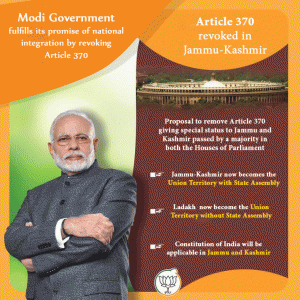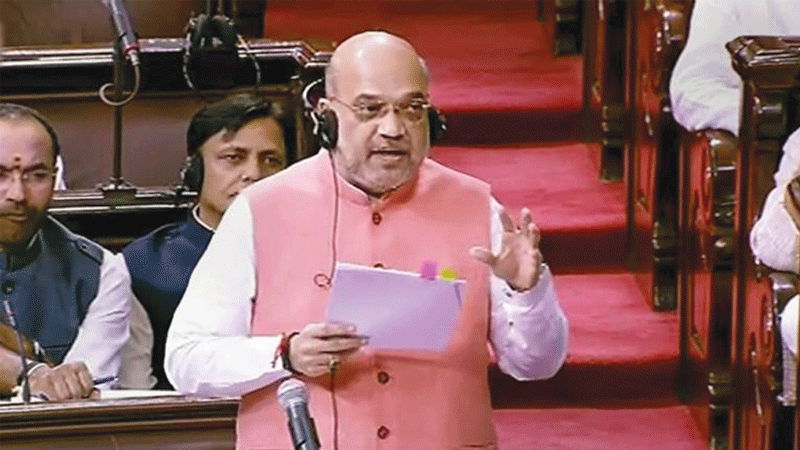Home Minister Shri Amit Shah replying to the points raised during the discussion on the article 370 and 35 A in Lok Sabha said that the parliament is fully entitled to take any decision within the Indian territory. Here, we are publishing the synopsis of the reply for our esteemed reader :
For the past 70 years, every person in this country has been claiming that Kashmir is an integral part of India. Surprisingly none of us has ever made this claim in respect of Uttar Pradesh or Bengal or Tamil Nadu etc. It is because the Article 370 had raised a suspicion in the minds of our citizens and the people living abroad about the real status of Jammu and Kashmir. I would like to congratulate the hon. Prime Minister that this blot on the face of our country is going to be erased today. A number of hon.
Members have participated in this discussion and have raised a number of queries. One of them is whether the Union Territory etc., status given to the State is forever. I would like to make it categorically clear that the status of a full fledged State will be restored to the Jammu and Kashmir as soon as the circumstances permit. As far as the question of POK is concerned, our claim on that territory is as strong as ever. As far as the resolution passed by the United Nation Organization is concerned, it was abrogated on the day when the Pakistan Army had crossed the international border in the year 1965. This House, therefore, is fully entitled to take any decision within the Indian territory. I would like to further add that had Pt. Jawaharlal Nehru allowed the Indian Army, the entire POK would have merged into the Indian Union.

A comparison has been made between the Article 370 and Article 371 during the discussion. I would like to make it clear that no comparison can be made between these two Articles and I would like to assure Maharashtra, Karnataka, Andhra Pradesh and all other States of the North-East that the Government of India has no intention to abrogate Article 371. The way adopted by the Government of India to amend the Article 370 has no element of unconstitutionality in it as the previous Governments had also carried out amendments in the same Article by adopting the same route. Further, the decision to deploy the security forces in the valley is precautionary in nature so that no person should try to disturb the law and order situation by instigating the local public. Some hon. Members have made suggestions to hold consultation. We have been holding consultation for the past 70 years and we are tired now. Further, we do not want to negotiate with the Hurriyat.
We will definitely hold consultation with the general public living in the valley if they do have any concern. I would further like to make it clear that there is no parallels between the Naga accord and the Article 370. The House should rest assured. We will not commit any blunder there. An argument has been given that terrorism in the Jammu and Kashmir drew its strength from the large scale unemployment. In my view, the feeling of alienation and terrorism in Jammu and Kashmir have their roots in Article 370. Another argument is that Jammu and Kashmir is a big State and it cannot be governed by an Advisor. Let the House know that the Jammu and Kashmir will have its own public representatives. The State will have its own cabinet and it will be run by them.
The Government does not have any communal agenda as not only Muslims but other communities like the Hindus, Jains, Buddhist and Sikhs etc also live in that State. Since the year 1989, about 41,500 persons have died in Jammu and Kashmir. I would like to ask the House whether we wish to tread on the beaten path or we should look other fresh avenues to defuse the situation. For how long we will be deaf to the aspirations of the people of Ladakh? Today, this House is going to correct a historic blunder. It is very surprising that not a single Member from the Opposition has enlightened the House about the possible benefit of the Article 370. How this Article can help the State? Because of this Article, the Government of India has not been able to apply 9 constitutional reforms and 106 Acts to the Jammu and Kashmir. The State does not have any Act to stop child marriage.
It does not have Minority Commission. A number of other legislations like the Right to Education Act, the National Council for Teachers Education Act, the Land Acquisition Act, the Whistle Blower Protection Act, the Multiple Disability Act, the Maintenance and Welfare of Parents Act, the National Commission for Safai Karamcharis do not apply to the State of Jammu and Kashmir. The delimitation exercise was held in the entire country but it was not allowed to be held in the Jammu and Kashmir. The provision of reservation for the Tribals and Dalits is not a part of the State Statute. The 73rd and 74th amendments to the Constitution are not applicable there. All these provisions will be applicable to the State of Jammu and Kashmir with the abrogation of this Article.
The industries will be set up. The educational institutions and public health institutions will come up there. The people will get employment opportunities and they will get rid of poverty. The value of their land will increase. A number of luminaries like Madhu Limaye, Ram Manohar Lohiya, Abdul Gani, Atal Bihari Vajpayee had supported the abrogation of Article 370. All of them were secular in their approach. I, therefore, would like to request the House to think afresh about this Article and grant the opportunities of development to the people of three region namely the valley, Laddakh and Jammu. Let them have an opportunity to integrate with the mainstream of India.


